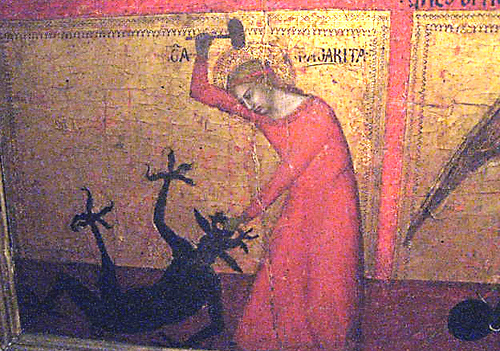We run our website the way we wished the whole internet worked: we provide high quality original content with no ads. We are funded solely by your direct support. Please consider supporting this project.

Warfare Worldview: A Basic Definition
The warfare worldview is based on the conviction that our world is engaged in a cosmic war between a myriad of agents, both human and angelic, that have aligned themselves with either God or Satan. We believe this worldview best reflects the response to evil depicted throughout the Bible. For example, Jesus unequivocally opposed evils such as disease, demonization, and even natural disaster (i.e. Jesus rebuked the storm) as originating in the wills of Satan, fallen angels, and sinful people, rather than of God.
This view is not ontologically dualistic, because while the Bible clearly articulates war between good and evil, it also clearly articulates God’s sovereignty. The battle that is currently raging is not everlasting, and when it ends, we are assured of God’s victory. In fact, the victory has already been won in the life, death, and resurrection of Christ (Col. 2:13–14), but the demise of evil has not yet been fully realized. Christians are called to wage spiritual warfare (Eph. 6:10–17) against evil through prayer, evangelism, and social action.
Many Christians have concluded that in order for God to accomplish his goal for creation, everything that happens in world history must somehow fit into his sovereign plan. This assumption has permeated the Church throughout most of its history. The assumption is often expressed in cliches Christians are sometimes prone to recite when confronting tragedies like cancer, crippling accidents, or natural disasters. Believers sometimes attempt to console themselves and others with statements like, “God has his reasons,” “There’s a purpose for everything,” “Providence writes straight with crooked lines,” and “His ways are not our ways.”
I call this understanding of God’s relationship to the world “the blueprint worldview,” for it assumes that everything somehow fits into meticulous plan and mysterious purposes of God—a divine blueprint. The view takes many different forms, but each version shares the assumption that, whether ordained or allowed, there is a specific divine reason for every occurrence in history. As traditional and popular as the blueprint worldview is, it is not without significant difficulties. For one thing, this view makes it exceedingly difficult to reconcile the evil in our world with the perfect goodness of God, especially when applied to specific instances of suffering and evil.
A second and even more fundamental problem with the blueprint worldview: It is, I contend, rooted in an imbalanced reading of the Bible. While Scripture emphasizes God’s ultimate authority over the world, it also emphasizes that agents, whom God has created, can and do resist his will. Humans and fallen angels are able to grieve his Spirit and to some extent frustrate his purposes (e.g. Gen. 6:6; Isa. 63:10; Luke 7:30; Acts 7:51; Eph. 4:30; Heb. 3:8, 15; 4:7). Scripture refers to this myriad of other angels and humans who refuse to submit to God’s rule as a rebel kingdom (Matt. 12:26; Col. 1:13; Rev. 11:15), and identifies the head of this rebellion as a powerful fallen angel named Satan. It is clear that God shall someday vanquish this rebel kingdom, but it is equally clear that in the meantime, he genuinely wars against it.
Unlike the blueprint worldview, the warfare worldview does not assume that there is a specific divine reason for what Satan and other evil agents do. To the contrary, God fights these opponents precisely because their purposes are working against his purposes.
Suffering takes on a different meaning when it is considered in the context of a cosmic war as opposed to a context in which everything is part of God’s meticulous plan and mysterious higher good. In the warfare worldview we would not wonder about what specific divine reason God might have had in allowing evil to occur to specific people. Instead, we would view these individuals as “victims of war” and assign the blame to human or demonic beings who oppose God’s will.
Following Scripture, we would of course look to God for comfort in the midst of our suffering, trust that he is working to bring good out of the evil, and find consolation in our confidence that the war will someday come to a glorious end. But we would not look to God’s purposes for the explanation of why any particular evil occurred in the first place. In the warfare worldview, this is understood to be the result of the evil intentions and activity of human and angelic agents.
As is the case with the blueprint worldview, the warfare worldview is not without difficulties. Foremost among these is the question of how this view can be reconciled with the biblical teaching that God is the all-powerful Creator of the world. Since the warfare worldview denies that God always has a specific reason for allowing evil deeds to occur, must it not deny that God is able to prevent events he wishes would not take place? We may state the dilemma this way: It seems we must either believe that God does not prevent certain events because he chooses not to or because he is unable to. The warfare worldview denies that God always chooses not to intervene, for this would require the belief that there is a specific divine purpose behind everything. Hence the warfare worldview must accept that, at least sometimes, God is unable to prevent evil. But how then can we continue to affirm that God is all-powerful?
My conviction is that, unlike the questions that the blueprint worldview raises, this question has a plausible answer. The trinitarian warfare theodicy argues that the answer lies in the nature of love. As Father, Son, and Holy Spirit, God’s essence is love (1 John 4:8, 16). God created the world for the purpose of displaying his triune love and inviting others to share in it (cf. John 17:20–25). I argue that it was not logically possible for God to have this objective without risking the possibility of war breaking out in his creation. The possibility of love among contingent creatures such as angels and humans entails the possibility of war.
Photo credit: vidalia_11 / VisualHunt.com / CC BY
Category: General
Tags: Blueprint Worldview, Evil, Open Theism, Satan, Theodicy, Warfare Worldview
Topics: Spiritual Warfare, Cosmic Conflict
Related Reading

What To Do with the Bible’s Talk of Satan
Recently, Roger Olson raised the question on his blog about why Satan is ignored in modern theology. He observed how Greg’s theology takes an “obvious, ‘up front,’ blatant belief in a very personal, very real, very active Satan who has great power in the world.” Because we often have so little to say about Satan…

What is the significance of Numbers 16:20–35?
After Israel’s sin under the leadership of Korah, the Lord said to Moses and Aaron, “Separate yourselves from this congregation, so that I may consume them in a moment” (vs. 21). Moses and Aaron pleaded with the Lord to only judge those who were most guilty. In response, the Lord modifies his judgment and gives…

What is the significance of Exodus 16:4?
The Lord commands the Israelites to gather only enough bread for one day while in the wilderness. “In that way,” the Lord says, “I will test them, whether they will follow my instruction or not.” Testing people to find out how they will resolve their character only makes sense if God is not certain of…

Lord Willing? Part 2
In Part 2 of Greg’s interview of Jessica Kelley about her book Lord Willing?, they discuss the theology that helped Jessica through her son Henry’s illness and death. You can find Part 1 of the interview here, and part 3 here.

Why is the World Still So Messed Up?
Through the Incarnation, Jesus made a way for our union with God. In addition, Jesus’ death and resurrection defeated the powers of evil. This should then lead us to ask: Why do we have to continue to fight evil? In fact, if the powers are defeated, a more basic question is: Why is the world still…

Why the 35W Bridge Collapsed – blog post 8/09/2007
As all of you know, I’m sure, a little over a week ago the 35W bridge in Minneapolis collapsed. This is the most traveled bridge in Minnesota. It was a tragedy, though the fact that only 13 people died and/or are presumed dead is really amazing, especially given that this happened at the peak of…
